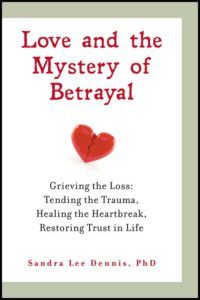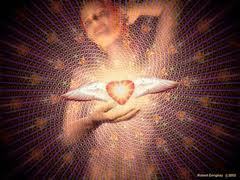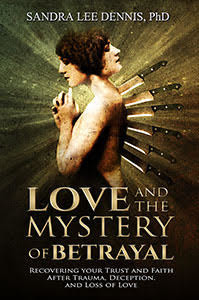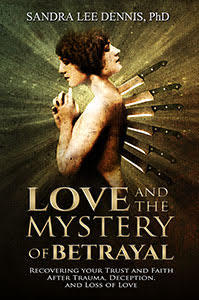Sandra Lee Dennis's Blog
April 7, 2020
Notes on Narcissistic Abuse
In our culture, narcissism has become endemic. Websites, Facebook groups, videos, blogs, books and articles abound on the subject. Narcissism is the individual and collective diagnosis of our times, one that is becoming overused, often to point a finger at anyone we do not like.
Still, narcissism deserves consideration in the context of betrayal and abandonment. The psychological manipulation and mind games that are a hallmark of this personality style are often cited as a primary cause of the devastation and trauma that abandonment and betrayal can bring.
Labeling itself can be self-serving; it is tempting to put someone in a conveniently labeled box in our mind, cut them out of our lives and shut them away there. But no one is defined entirely by a predominantly hurtful personality pattern: We are all larger and more majestic than any label we can apply.
However, understanding how destructive personality patterns operate can help to make sense of bewildering situations in which people act in deeply injurious ways. When someone’s behaviors hurt us, or the people around us, we have a right and responsibility to question, confront and challenge both their actions and our reactions. We have a right to name what we see if it helps us or someone else to make sense of and ultimately recover from the damage done.
We all have narcissistic parts of ourselves, places of wounding where our early needs for love, affection, attention and mirroring were neglected. As babies or young children, not getting our needs met registers in the brain as a life-threatening event. The developing psyche freezes around these threats to survival as a form of protection from the extreme pain. As our personalities grow, we defend against feeling these primal agonies by imagining we are special, entitled or different from other people.
We are touchy around our narcissistic wounds. Most often, when our early wounding gets mildly stimulated we automatically feel that we are somehow better or worse than other people. If we feel really hurt, we may react by wanting to cut the person who offended us out of our life, or to hurt them back in some way. Everyone experiences these feelings at times. But there is a big difference between having narcissistic tendencies or episodic reactions to life crises and narcissism as a rigid, all-pervasive way of life.
We can picture narcissism on a continuum from normal and mild to extreme and destructive. A deep-enough early wound to one’s sense of self-worth causes deep pain, unbearable shame. For the extreme, “malignant” narcissist I will be referring to here, fending off this pain by passing it on to others has become a virtually unconscious way of life.
Except for the most obvious, self-centered, grandiose types, narcissists can be difficult to detect; yet they can be intensely dangerous and destructive in intimate relationships. They are cunning and clever, and come in many different disguises. The more self-effacing ones that build you up and tend to treat you as the dominant personality can be the most damaging of all.
The Extreme Narcissist
Beware! Some people will sell you a dream and deliver a nightmare.—Anonymous
While both men and women can be narcissistic, it is estimated that 85 percent of extreme narcissists are males I use the male pronoun in this article, but all of the behaviors I describe are applicable to both men and women who have narcissistic personalities.The scary part is these people look completely normal, even more charismatic, charming and caring than the average person.
The defenses they develop to the wounds to their self-worth cut them off from any genuine feeling at an early age. They were not mirrored or properly attuned to as babies and children, so they never developed empathy. Instead, they formed a false self to protect them from this terrible pain and to be who they believed they needed to be to get the love they lacked.
Narcissistically wounded types know how to read people. They rank high on emotional intelligence; but they often use their gift, honed at an early age, to manipulate others to get what they want for themselves—primarily approval, affection and attention. They need other people to validate their self-image. Their extreme lack of empathy and need for control causes them to relate to people as objects. They are predatory, seeking out others to shear up their false self-image by idealizing or devaluing them. Otherwise, they have no interest in you.
They cannot help being master manipulators; it is how they survive in a world that terrifies them. They have mastered the art of deception and deceive themselves as well as others into believing in the persona they project. They live in the eyes of other people and do not do well alone. How others view them is highly important and they go to great extremes to maintain their self-image, adapting different personas for different people to give the desired effect. They work hard to cast themselves in the best possible light.
To get the attention and admiration they require for their equilibrium, narcissists have learned to be exceptionally talented actors, the smoothest con artists. While they are incapable of authentic relationship, they have learned to enact emotions, especially empathy and caring, which they sense they lack, from observing others. Their apparent sensitivity is uncanny—sometimes it doesn’t quite fit the situation and makes you wonder, but can still be highly disarming. They only reveal their true colors once you are already caught in their net of charm, seduction and manipulation.
The Narcissist in Love
The one who loves the least, controls the relationship—Robert Anthony

If at all possible, you want to avoid getting into a romantic relationship with a narcissistically wounded person. They will likely wear down your dignity and self-worth, and they may hurt you very badly. When a narcissist focuses on you as a romantic partner, at first he launches a charm offensive.
He will play the magician who will persuade you how much he cares. Often, he shows up as an unbelievable dream match ready to move fast into partnership. He may lure you in by convincing you that you are everything he ever wanted—especially in comparison to his former partners. He will win you over and gain your trust by acting the doting lover and playing on your dreams and vulnerabilities. You will not believe how much you have in common.
Narcissists do this with some ease because of their ability to change chameleon-like into whoever you want them to be. Like Woody Allen’s character, Zelig, in the film by the same name, they have no enduring center in themselves and reflect back to you to play your dream man. In fact, if a narcissist has targeted you to fill the lover or partner role in his personal drama, you likely will feel that no one has ever “seen” or understood you so completely. He idealizes and passionately adores you in the beginning. He seems so proud to be with you, and he is, as you have been carefully selected—not because of his feelings for you, but for your qualities or resources that enhance his self-image.
Narcissists often employ a laser-like focus, studying you for your weaknesses—information they will eventually use against you. He appears to be so engrossed by all the details of your life and wants to know everything about you, hanging on your every word. Seeming curious, empathic and considerate, he will set apart times to pay special attention to asking many questions while he tracks your feelings in response to his words and actions.
He engages your trust and emotional dependence by playing on your own narcissism and weak spots. He tells you whatever it is he determines you want to hear in order to win you over. Your defenses will likely soften as your trust grows in light of so much praise, attention and interest. Since you appear to have so much in common, you will easily let him into your life, sharing your dreams and vulnerabilities and opening your heart. You may come to believe—perhaps too easily—in his love and devotion; it is natural to believe someone who tells you everything you have ever wanted to hear!
When you are this far in, should you hear reports about troubled previous relationships, even direct communications from former wives or lovers, you are likely to dismiss them because you have come to believe it will be different with you. You believe in the “specialness” of his love for you.
The Turn from Idealizing to Devaluing
The opposite of love is not hate, it’s indifference.—Elie Wiesel
 After a narcissist has inflated his self-worth by convincing you of your specialness to him—and thereby his own for having won you over—the honeymoon phase passes. Once he has drawn you into his game, his interest drops precipitously, as now you are safely in place to provide him with attention when he needs it. The first thing you notice is that his availability has become dependent on his convenience and wishes, irrespective of your needs or wants.
After a narcissist has inflated his self-worth by convincing you of your specialness to him—and thereby his own for having won you over—the honeymoon phase passes. Once he has drawn you into his game, his interest drops precipitously, as now you are safely in place to provide him with attention when he needs it. The first thing you notice is that his availability has become dependent on his convenience and wishes, irrespective of your needs or wants.
When a narcissist reaches this point, he has begun the slow process of devaluing and destabilizing you. He cannot tolerate equality in relationship. He must always be one-up or one-down. His primary method of destabilizing emotional abuse is to use bait-and-switch, or seduce-and-abandon methods. He will run unpredictably hot and, alternating warm, loving care with cold indifference, anger or contempt to hurt and weaken you and increase your dependence on him.
He may begin to flirt with other women in front of you. This is the point where he will start to cheat on you, if that is his style. Or he could make a habit of walking out on you and then returning, keeping you guessing about his whereabouts, accusing you of possessiveness and jealousy if you are upset. Your hot Romeo may become someone barely interested in sex, as withholding himself sexually can be a potent tool in his control arsenal.
Now that he has learned your weaknesses, he will find a way to make you feel undesirable, insensitive, incompetent, unstable, forgetful or crazy—depending on your insecurities and which qualities of his own he cannot bear and is projecting on you. In addition to half-truths and revising history, he may tell you outright lies, withhold crucial information, or begin to blame and criticize you.
Of course, he will imply this is your fault. If you treated him properly, and he were not so wounded by you, perhaps he would have more interest. Narcissists often specialize in playing the victim—accusing you of what they are doing to you. He enjoys twisting reality to make you believe you are the problem. He uses half-truths to subtly revise past conversations or events to cast you in a bad light and avert responsibility for his actions. He will make you question your memories and perceptions about what is really going on—also known as gaslighting—to the point of undermining your confidence and, eventually, your sanity.
You may begin to notice you need to walk on eggshells not to upset him. If you do question his version of events, his hot and cold behavior—or the distorted self-images that he expects you to uphold, regardless of how much his behavior contradicts them—he may turn on you in an instant and attack or abandon you. You are, however, in most danger if you unconditionally commit to him and stop reacting to his destabilizing tactics. This is a sign to him that he is losing control.
At this point, when things start to seem a little rocky with your dream man, couples counseling may seem like an attractive option. However, that is a big mistake. He is likely to charm the therapist with his theatrics and leave you on the defensive. The more psychologically sophisticated types especially love this game. And he will not be able to keep from using the knowledge of your emotional wounds that he gains there to target your vulnerabilities and tear you down.
The truth is, a extremely wounded person like this cannot tolerate their own pain and manage their lives by having someone to control in order to project their own inner torments. They infiltrate your energy body with the substance of their fake affection and disowned shame, and confuse you with their mind games. In time, this treatment is likely to drain and destroy your self-worth. The worst is, it is so insidious, you may not realize what is happening to you.
This is likely not conscious behavior, it is simply the way they have learned to feel stable and alive—by manipulating and destabilizing those closest to them. The people they select as intimate partners often become victims of this predatory psychic and emotional vampirism. They attach to you originally for your perceived strengths, which they lack. Being with you enhances their self-image, but also stirs deep envy and rage, that eventually will cause them to tear you down.
As your insecurity and self-doubt grows, your confusion and pain acts like an addictive drug, a painkiller that helps them hold themselves together. This may seem like an extremely dark depiction and if you haven’t experienced this firsthand you may wonder if I’m not simply writing through the biased filter of my own hurt. But if you have read this far, you likely know from experience what I am writing about. Unfortunately, this scenario I describe is all too common.
At the first moment your narcissist feels threatened, either by your demands for increased intimacy or signs that you may be on to him, he will turn on you. If he senses you backing away, however, he reverts to charm and seduction again to keep you at an optimal distance, where he can use you if and when he chooses—to devalue you or have you shore him up. If he cheats on you and you find out, or you try to leave him, he will manipulate your feelings, full of apologies, swearing reform in order to pull you in again. He cannot tolerate rejection or abandonment himself.
If you suspect you are in a relationship like this, I suggest you begin to keep a careful, written record of what happens between you and what is actually said in order to have a touchstone for your sanity as he begins to erode and dismantle your reality. Once an abusive narcissist has penetrated your defenses and insinuated himself in your psyche, it is very difficult to pull out the hooks. He may stay with you a week or twenty years, taking what he needs from you, as you grow weaker and weaker in his atmosphere.
When a Narcissist Leaves
He will teach you about love by showing that you cannot tell a sinister enchantment from a divine light.—Alison Nappi
If he decides to leave you, most likely he will do so without warning, in a rage, to punish you for a perceived intolerable injury to his self-image. On the other hand, he may draw the process out with a long series of threats—like a cat playing with a mouse. Or he may just disappear. By this time, he has managed to devalue and destabilize you so thoroughly that he cannot imagine how he could possibly still be associated with such damaged goods.
Most likely he will leave you without explanation or consideration. Why should he waste his energy explaining, when he no longer has any use for you? You have likely been thoroughly discredited in his eyes, so anything you might have to say—if he is even willing to give you a few minutes of his precious time—will be disregarded anyway.
He needs to garner his resources for his next conquest. He may throw you away like yesterday’s garbage and nonchalantly replace you with a shinier, new partner who can provide him with the admiration he imagines he deserves. You will be stunned by his radical personality change—the callous indifference of your formerly ardent admirer and lover will leave you spinning. He now treats you as if you do not, and never did, exist. And to him, you do not—you were simply an object he used up and is now finished with. He is finally showing you his true colors: He does not care and never did actually care for you personally.
But you have been left with a lasting legacy of broken dreams, trauma and devastation as you begin to realize the truth. And It may take a long time to sink in for someone who is capable of honesty and empathy to believe that someone else is not be put together in the same way. It may help to realize that when narcissism develops to this degree, as a way of life, it is a kind of mental illness. We do not easily comprehend such an imbalance is possible in someone who seems so normal in other ways.
This is one of the reasons destructive narcissists so often get away with their behavior; they are adept at hiding what they do, and the destruction they inflict happens only one intimate relationship at a time. To the rest of the world, they come off as entirely normal, even more charming, generous, caring and concerned than average.
The truth is narcissists typically have no shame, conscience, or empathy for you or anyone else, and will often stop at nothing, including attacking your credibility, to preserve their frail self-image.They are practiced at disavowing any responsibility for the harm they cause and deflecting the blame onto you. Remember they specialize in innuendo and half-truth and will not hesitate to discredit you and assassinate your character if it is necessary.
You will want to defend yourself and may find yourself wanting to turn on them. But you will never beat them at their game, so do not even try. They can be vicious when it comes to maintaining their self-image, as it is their lifeline to survival. They will not tolerate exposure of who they really are and will knife you in the back in a heartbeat if you speak the truth of what you know about them. They will not hesitate to turn people against you, including your own children, in order convince as many people as possible that they were the victim of your nefarious behaviors. Prepare yourself, and try to remember that manipulation, charm and lying are the only ways they know to manage their lives.
However, you will more than likely continue for some time to make excuses for him and refuse to believe that he could possibly have behaved so ruthlessly and heartlessly and take no responsibility for his behavior. The part of you he seduced will want to believe in the promise, in the person he pretended to be. You may not be able to absorb the extent of his inauthenticity for a long time.
It is traumatic and utterly shattering to realize you have been living a lie in the department of your most vulnerable feelings. It is devastating to realize you have been drawn in and given your heart to a charade.
Recovering From Narcissistic Abuse
An insincere and evil friend is more to be feared than a wild beast; a wild beast may wound your body, but an evil friend will wound your soul.—The Buddha
 You may never find “closure” with those suffering from deep narcissistic wounding. Their inability to face their own shame makes them shameless; hence they have no true remorse for what they have done. In fact, the more they hurt you, the more they will justify their actions by blaming you and casting themselves as the victim.
You may never find “closure” with those suffering from deep narcissistic wounding. Their inability to face their own shame makes them shameless; hence they have no true remorse for what they have done. In fact, the more they hurt you, the more they will justify their actions by blaming you and casting themselves as the victim.
They are, however, likely to come back to you between conquests or when they need a hit of attention or power. Beware, you are easy prey now for their mind games. Should you believe their entreaties, or try to sort out the bewilderment they left you with, after being drawn in, you will be treated to barely-veiled disdain and contempt, or magnanimous condescension on a good day.
Every interaction you have with them will only destabilize you further. It is the most difficult thing to do, but cutting off all contact will help you most to eventually get their parasitic energies out of your system. The apologies or promises to change you are hoping and praying for will only add insult to the injury. With a person like this, his words mean nothing, while his actions speak the truth of who he is and what he thinks of you and other people. Believe in what he does, not what he says.
Any regrets he decides to express will likely turn out to be all about him—empty, disguised statements of blame or explanations for failing to hold his image together—and zero about what his behaviors have done to your life. You may find him also using his regrets to further craft his self-image as a caring or responsible person, with no true concern for you and no follow through.
Most people who have fallen for a destructive narcissist will tell you that when you do, you hand yourself over to be cut open to your core. The legacy of narcissistic abuse is to find yourself traumatized and left alone to pick up the pieces of your shattered reality, often with a severe case of PTSD. Their games can rip your heart out and poison your soul and it can take months, even years to recover your self.
If you suspect you have been or are in relationship with such a deeply wounded narcissistic person, you will likely need help to get away or to deal with the poisonous aftermath. It takes love and care to extricate the ghost that lives on in you. Your nervous system will need recalibrating, and you will need to revise your life story to account for the deceptions you lived. I strongly recommend you get into trauma therapy (EMDR or Somatic Experiencing) as quickly as possible.
Finding a circle of others who have had the same experience can be helpful to validate your experience. Because of the shame associated with having fallen for these games and manipulations, the emotional rape really of your most delicate nature, it takes courage to speak up about it to anyone, especially someone who hasn’t been through it themselves.
The grieving will likely be long and hard, but can take you to new depths of love, compassion and soulfulness. To recover, you will have to undergo a painful encounter with your own narcissistic wounding and early trauma— the hooks your narcissistic partner found in you. But it will strengthen you to shed that painful skin and to find a deeper source of authenticity and love in yourself. It may destroy a part of you—think of it as dead wood, a former self that is ready for radical revitalization—but eventually liberate you to realize that the behavior of your narcissistic partner was stunningly predictable. His behavior was not about you at all, but about a profound inner emptiness and suffering he could not endure.
As you absorb the hard truth about your partnership, you may notice waves of compassion for the predicament of this person you loved—closed off as they are from their heart, their authentic self and the chance of true relationship with anyone. It can help your heart to heal to pray for the same for them.
With support, grace and determination, tending your own tenderized, broken heart, you will come to realize your own preciousness and value, regardless of how you were treated. Your love, though misdirected, cannot be tainted by whether or not it was received. That love remains in you. In time your pain, held in tenderness, becomes a prayer that leads to a greater love abiding in your own heart.
Receive notification of Love and the Mystery of Betrayal ‘s publication, and relevant blog posts here:
The post Notes on Narcissistic Abuse appeared first on Sandra Lee Dennis, PhD.
December 28, 2017
Winter and Trust in the Return of Light

“Joy and woe are woven fine, A clothing for the soul divine…” — William Blake
Winter solstice, the year’s end! My favorite time of the year. The veil thins between worlds. The mystery of a loving universe, our trust in the light, seems to shout for notice in song, celebration, and expressions of care.
Warmth inside reaches out with cards, gifts, prayer, giving, and forgiving. The Christ Light paradoxically glows with more insistence now. Sometimes when I pay deep attention, I can sense, almost unbelievably, angel-like forms caressing my heart with butterfly kisses. No wonder so many believe in angels.
Our lives follow the seasons, each on our own cycle of beginnings, growth, and the bittersweet of endings. Our individual dark days internally can come on anytime, of course. For many who read my posts, they have been brought on by shock, trauma, loss, betrayal, heartbreak.
Little Signs of Light in the Dark
During nature’s winter, we can take at least two cues from her for enduring these dark times.
First, we can practice patience—that underrated wintery virtue. When we are hurting, it can seem like the dark days will never end. We feel stuck on a frozen plain of numbness, lethargy and depression. Or trapped in a seemingly endless cycle of sadness, anger, pain or disappointment hovering around like avenging Furies.
When the heart is broken (and I believe we all are broken hearted down deep, but that is another subject), we need to take tiny steps to rebuild trust. We need slowly to re-enter that hurting place where the light still glows within.
This brings us to the second inspiration from the dark days of winter. We need to nurture faith and trust that the light will return. Despite a conviction that the winter will never end, how important it is now to linger with, nourish, and celebrate any goodness that comes our way.
The smaller, the more ordinary the goodness; the better!
The morning sunrise glinting through the trees, the wag of the dog’s tail prancing by, the low shadows of late afternoon, the smile of a stranger, an inspiring idea in a book or movie, the first sip of coffee or tea, the rush of pleasure from a hot shower, or the warm coziness of crawling into bed. These are seed moments! They plant hopefulness on the barren plain of heartbreak.
So, let’s not allow these little moments of life’s goodness to go unnoticed. Nurtured, they begin to rebuild the heart’s strength. Stop, pause, breathe, drink in the sensations, whispering a little prayer of thank you, thank you, thank you. For this warmth, this sweetness, this beauty, this breath; for this life, this miracle…here, now.
Soon we discover these little signs of light rekindling our trust. Astonishingly, we begin to sense that even this hurt is bringing us to greater goodness and light than we have ever known before.
“Love and the Mystery of Betrayal”— available in print and ebook.
A powerful book that will serve many.—Tara Brach, PhD.

Buy Love and the Mystery of Betrayal on Amazon
Soul-satisfying empathy and validation, as well as higher-self, love-focused guidance on how to respond and heal. A rare combination.—K. Later, Amazon
The post Winter and Trust in the Return of Light appeared first on Sandra Lee Dennis, PhD.
September 23, 2016
Learning about Narcissism in Betrayal Recovery
In recovering from abandonment or betrayal, learning about destructive narcissism can help you heal. Naming this brand of emotional abuse opens the door out of denial into the facts of what has happened.
What a relief to realize you are not losing your mind. Nor are you alone in this unhinging experience. It is not all your fault, after all.
It gives you back your ground to learn such charming, yet disordered personalities exist. Those who learned to survive by undermining and shaming others. These people pull you in with charm and attention, then begin to devalue, ignore, insult, and often discard you.
While you are caught in this web of gratification and hurt, pleasure and fear, you hardly see it. The slow-drip confusion and pain of emotional abuse breeds denial for self-protection.
Also, the covert abuse, laced as it is with warmth and affection, keeps pulling you back in. Their hot and cold, unpredictable behavior keeps you in a constant state of unease, anxious and insecure. Yet, you long for crumbs of warmth and affection from them to soothe your jangled nerves.
Learning about narcissism, you begin to understand how easily a biochemical “trauma bond” forms in these circumstances. How notoriously difficult these bonds of pain mixed with pleasure are to break. Most importantly, you see you will need help to recover.
Moving beyond focus on narcissism…to the heart
This is why learning about narcissism in betrayal recovery is vitally important to healing for many. Eventually, however, in coming back from the dark hole of lost trust, we need to move beyond focus on the abuse.
Otherwise, it can become a barrier to the heart-opening that truly heals. For to recover from the soul loss, to restore trust in life and ourselves, we need the vast healing capacities of the heart.
Recognizing what happened to us helps us come out of the protective haze of denial to face the broken heart. Dropping into the heart opens the door to compassion, but at a price. Moving into the heart means feeling the pain of what has happened.
While this movement cannot be rushed, there—in the midst of our own brokenness—we make a startling discovery. There waiting for us we find holiness, we find love: Loving spiritual forces appear ready to help, to hold and to heal these deep wounds.
Brokenness does not feel like a place where holiness would want to dwell. Yet, as we feel into the griefs of the betrayal, we are bathed bit by bit in the warm outpourings of tenderness. Then, something even more surprising happens.
We begin to sense in our bones the suffering of the one who hurt us. As we soften, we see the bewildered, shamed, angry little one behind their manipulative, hurtful armor. Compassion flows as a miracle, freeing our hearts from the heaviness of harm.
“Love and the Mystery of Betrayal”—now available in print and ebook.
A powerful book that will serve many.—Tara Brach, PhD.

Purchase on Amazon
The post Learning about Narcissism in Betrayal Recovery appeared first on Sandra Lee Dennis, PhD.
March 13, 2016
Bearing the Beams of Love
“We are put on this earth a little space, to learn to bear the beams of love.” — Wm Blake
A while back, I had occasion for a great welling of joy within a relationship. For a couple of weeks, I lived within a magical circle of mutual sweetness, loving and devotion.
During this blessed time, I was surprised to notice that the joy emanating from my heart was almost more than I could bear. For several days, along with the warmth and delight, it felt alarmingly as if my chest were about to burst open. The expanding joy had brought along achy anxiousness as a sidekick.
As might be expected in the rhythms of relationship, as events unfolded, distance of a force equal to the joy slowly set in. The growing dissonance triggered what I recognized as my core wound. What I have come to call my “holy wound” I can best describe as unbearable chest pangs, like a hole in my heart—accompanied by a sense of being unwanted, ashamed, and terrified of falling into a bottomless well of isolation.
Since I became aware of this wound after a difficult abandonment several years ago, I have done my best to accept these feelings whenever they appear. Instead of distracting myself, or working to make the pangs go away, I—in true mindfulness fashion—have tried to accept them in as neutral and detached a way as possible.
Loving Kindness is Not Neutral
This time, however, when the hurt arose I realized how lukewarm and ambivalent my acceptance has been. The warmth, connection and joy that had so recently expanded my heart to the point of bursting wrapped around the scary pain. No longer lukewarm, I felt a welling of passionate loving for these terrible feelings.
As I breathed into the now familiar pain, I heard a voice within whispering, “I love you; you are beautiful to me; you are a precious part of who I am; I am so sorry you are hurting.” And I felt delicate fingers of light caressing the longing.
Apparently, the vulnerability and loving I had risked in the relationship were available now for me and penetrated the wounds in a new soft way. Knots of despair and anxiety began to open up in response to this love. As the hurts softened, a soothing warmth filled my veins with sweetness, the marrow of my bones with strength, and my heart with compassion.
The unexpected elixir held tight in the pain revealed the hurt as a veil covering a deeper love. This is why our core wounds are sacred. When we are finally able to feel them directly, they not only call us to love, they teach us how to love. When we embrace them warmly, as we would a child in distress, they become a portal, a body prayer asking for what we most want in our heart of hearts.
I see now more clearly than ever. Before we can truly open to love one another, we must be willing to surrender, to trust enough to receive love. From nature, our family, friends, loves, animals, art, music, our breath, our Higher Selves, the source does not matter. Once we allow love to enter, we can finally, at long last, offer that loving to the most rejected, outcast parts of ourselves.
To read more about the transformation of suffering and opening to love….
“Love and the Mystery of Betrayal”—now available in print and ebook.

Buy Love and the Mystery of Betrayal on Amazon
The post Bearing the Beams of Love appeared first on Sandra Lee Dennis, PhD.
Bearing the beams of love
 We are put on this earth a little space, to learn to bear the beams of love.— Wm Blake
We are put on this earth a little space, to learn to bear the beams of love.— Wm Blake
A while back, I had occasion for a great welling of joy within a relationship. For a couple of weeks, I lived within a magical circle of mutual sweetness, loving and devotion.
During this blessed time, I was surprised to notice that the joy emanating from my heart was almost more than I could bear. For several days, along with the warmth and delight, it felt alarmingly as if my chest were about to burst open. The expanding joy had brought along achy anxiousness as a sidekick.
As might be expected in the rhythms of relationship, as events unfolded, distance of a force equal to the joy slowly set in. The growing dissonance triggered what I recognized as my core wound. What I have come to call my “holy wound” I can best describe as unbearable chest pangs, like a hole in my heart—accompanied by a sense of being unwanted, ashamed, and terrified of falling into a bottomless well of isolation.
Since I became aware of this wound after a difficult abandonment several years ago, I have done my best to accept these feelings whenever they appear. Instead of distracting myself, or working to make the pangs go away, I—in true mindfulness fashion—have tried to accept them in as neutral and detached a way as possible.
Loving Kindness is Not Neutral
This time, however, when the hurt arose I realized how lukewarm and ambivalent my acceptance has been. The warmth, connection and joy that had so recently expanded my heart to the point of bursting wrapped around the scary pain. No longer lukewarm, I felt a welling of passionate loving for these terrible feelings.
As I breathed into the now familiar pain, I heard a voice within whispering, “I love you; you are beautiful to me; you are a precious part of who I am; I am so sorry you are hurting.” And I felt delicate fingers of light caressing the longing.
Apparently, the vulnerability and loving I had risked in the relationship were available now for me and penetrated the wounds in a new soft way. Knots of despair and anxiety began to open up in response to this love. As the hurts softened, a soothing warmth filled my veins with sweetness, the marrow of my bones with strength, and my heart with compassion.
The unexpected elixir held tight in the pain revealed the hurt as a veil covering a deeper love. This is why our core wounds are sacred. When we are finally able to feel them directly, they not only call us to love, they teach us how to love. When we embrace them warmly, as we would a child in distress, they become a portal, a body prayer asking for what we most want in our heart of hearts.
I see now more clearly than ever. Before we can truly open to love one another, we must be willing to surrender, to trust enough to receive love. From nature, our family, friends, loves, animals, art, music, our breath, our Higher Selves, the source does not matter. Once we allow love to enter, we can finally, at long last, offer that loving to the most rejected, outcast parts of ourselves.
To read more about the transformation of suffering and opening to love….
“Love and the Mystery of Betrayal”—now available in print and ebook.
The post Bearing the beams of love appeared first on .
December 5, 2015
Recognizing Hidden Emotional Abuse in Relationship
 I frequently mention that our culture does not recognize abandonment and betrayal as traumatic shocks. The shock occurs partly because being deserted or cheated on usually comes as a final blow in a mind-numbing, repetitive cycle of emotional abuse.
I frequently mention that our culture does not recognize abandonment and betrayal as traumatic shocks. The shock occurs partly because being deserted or cheated on usually comes as a final blow in a mind-numbing, repetitive cycle of emotional abuse.
Elusive abuses of power wear a person down over time until you come to accept them as normal. Only when you are on the receiving end of the final blow does the manipulation, undermining and devaluation you have been living with sink in.
Quickly you realize what your confusion and pain have already been telling you—emotional, also known as mental or psychological, abuse is often more harmful than physical abuse. At least with physical abuse, you know what hit you.
Emotional abuse comes in many flavors. It is actually a form of brain-washing that can rapidly undermine your quality of life. Overt forms of abuse, such as yelling, criticizing, bullying, etc. are also easy enough to recognize. But covert psychological abuse is difficult to detect and substantiate. It eats away at your self-esteem and can cause you to question your sanity before you know it.
Being in relationship with a “nice guy” covert abuser can destroy your trust in yourself, your self-worth and confidence, and finally even your sense-of-self. Without you even realizing what is happening.This is why the more you know about the subtle, hidden forms, the better equipped you will be to recognize what is happening to you. You will need this knowledge to extricate yourself, and to do what it takes to heal if the damage has already been done.
The Many Forms of Hidden Emotional Abuse
Are you or have you been, for instance, in a relationship with anyone who criticizes and blames you for their feelings and moods? Abuse often initially slips into a relationship through blame. “I may have yelled, but you attacked me first.” “If you treated me better (or took better care of yourself), I might feel like having sex with you.” Do they routinely transfer or project their feelings of fear, shame, worthlessness or anger onto you? When blame, criticism and projections are repeated often enough by someone you trust and love, you begin to question your own perception of reality.
Are you with someone who walks out on you repeatedly or threatens abandonment because of something you do or say?—as if you are on probation with them? Do they accuse you of things you know are not true? Do they revise history, casting you in a negative light? Make promises they routinely forget or don’t otherwise keep? Randomly disengage from you, withdrawing affection and attention, with no explanation?
Meanwhile, do they give large quantities of attention to other people, activities, work, or hobbies for extended periods of time, as if you are an afterthought? Give you the silent treatment, or stonewall you (refuse to listen)? Do they disregard or “forget” commitments or promises, while asking “Why you are upset? What is your problem?”—assuring you nothing is wrong?
Beware of Trauma Bonding
Do they run hot and cold, regularly interspersing these hurtful, destabilizing behaviors with attention, warmth and “love-bombing—such as bringing you flowers, cards, and gifts, offering apologies and professions of your specialness and their love for you? Do they routinely seduce and abandon you in little, everyday ways; give love and take it away—over and over again?
If so, they may be forging a trauma or betrayal bond with you that is difficult to break. Whether they know it or not, they are playing on your trust and vulnerabilities to increase your attachment to them and their power over you. Likely, they are not even consciously aware of what they are doing. Abusers routinely deny and justify their hurtful behavior. For many, emotional abuse has become second nature—an ingrained way to manage their own pain, shame and fear, by passing these feelings on to you.
More on emotional abuse and trauma bonds in the next post…
“Love and the Mystery of Betrayal”—now available in print and ebook.
The post Recognizing Hidden Emotional Abuse in Relationship appeared first on .
October 13, 2015
You Have Every Right to Outrage
“When it comes to abrupt endings related to love, the experience is very similar to being the victim of a blunt force trauma. The symptoms are the same, and your functioning drops to the level of someone who needs to be hospitalized and treated for injuries.”—Dr. Andra Brosh, The Huffington Post
Several years ago my long-time partner left me shortly before our wedding. Blindsided, I went reeling from the loss, but primarily from the deceptions and betrayal of trust involved. For a long time afterwards, I was in shock and did not know it.
During those dark days of bewilderment—and what turned out to be PTSD—I felt lost and alone. Nothing made sense anymore. The unbelievable pain, outrage, shame, humiliation, hyper-vigilance, flash-backs, and obsessing blew my world apart. Mostly, I could not figure out why I could not pull myself out of it. What was going on?
My well-meaning friends and family were not much help either. Most tended to dismiss and downplay what had happened. Not only that, it was pretty much assumed I must be implicated in my ongoing distress. How many times did I hear: “Calm down, let it go,” “You must have provoked him,” “Surely you saw it coming,” “You chose him, after all,” along with, “Just get over it!” or “Move on!”
These common judgments, also known as blaming the victim, added to my humiliation and the stigma of having been abandoned. They also seemed to absolve my partner from responsibility for inflicting this shock. Most everyone, including myself, was turning a blind eye to the trauma, the emotional violence, and the power dynamics involved.
Blind to Betrayal and Powerlessness
It took a long time for me to realize that we live in a world that is blind to betrayal. In our culture, we not only reject emotional pain, but revere power and control, and disdain victims and losers. Platitudes that blame you for your pain and brush off the emotional abuse you have endured barely hide a contempt for powerlessness in any form.
It helps to realize that these common attitudes go beyond reactions to you personally. They reveal a collective wish, a wish to “exorcise the specter of the rejected individual.” (A. Carotenuto, To Love, to Betray, 1996, p.95) As mortal human beings, we simply do not want to acknowledge our essential powerlessness. So, we turn away when we see it so blatantly revealed in others or ourselves. In this atmosphere of denial, we run the risk of never acknowledging what has happened and getting the help we need to recover.
The simple fact is that when someone you have deeply trusted turns overnight on you, going from devoted partner to contemptuous or indifferent stranger, you have been violated to the core. Regardless of the intentions, childhood wounds, needs, defenses, complexes or excuses of the betrayer—you have been psychically assaulted. Such an abrupt turnabout inflicts real pain, tears apart your world, renders you powerless, and shatters native trust.
You are left with emotional injuries that will impact the quality of your life going forward. Yes, your injuries are invisible, internal, but just as debilitating, if not more so, than a physical blunt force trauma—as if you were run over by a proverbial bus, not just metaphorically either. We now know that the tormenting interplay of pain and longing rejection causes has measurable physical counterparts. (See my post “Rejection in Love” or M. Laskley’s, “This Is Your Brain on Heartache.”)
Add the fragmenting of your identity, heart and soul the trauma sets off; and you understand why you have every right to outrage and indignation at this violation. These reactions are the psyche’s first line of defense against this massive threat to your well-being. The life-threatening distress it causes—a threat to the life of your soul—is one reason some go so far as to call betrayal emotional or spiritual rape.
To be continued in the next post….
Adapted from
“Love and the Mystery of Betrayal” —now available in print and ebook.

The post You Have Every Right to Outrage appeared first on .
May 13, 2015
Transform Suffering with Creativity
“If you don’t transform your suffering, you will surely transmit it.” —Richard Rohr
 Although I have written and published two books during the past fifteen years, I have never considered myself a writer.
Although I have written and published two books during the past fifteen years, I have never considered myself a writer.
Ernest Hemingway said, “There is nothing to writing. All you do is sit down at a typewriter and bleed.” So it was for me. I have been compelled to write during periods of my life when I was most distressed. I have come to realize that creative expression can transform pain. When we are suffering, it unleashes a lot of survival energy and drives creativity in an effort to relieve the pain.
The worse the suffering, the more our whole being moves to respond. In the process we are led to discover how we are being called to show up in the world. Writing, or any creative activity—including things like cooking or gardening—provides a way to structure or reframe experience. Creative focus encourages compassionate detachment. Through an art form we move the suffering outside ourselves into the pool of human experience. In this way, we transform suffering with creativity.
The “Labor” of Creating
After my first book was published, I swore I would never write another. But as time went on I had the idea that maybe I “should” write another book. I was in a time of contentment, and decided I would write about “happiness.” Although I tried to write each day, over a two-year period I only amassed around fifty pages; I just could not get into it. I was too busy enjoying my life, doing other things.
Then, at the apex of all this happiness, my long-time partner abruptly left me a few weeks before a big wedding we had planned. The shock/trauma of his turnabout blindsided me severely and led me into the worst suffering of my life. The more the pain intensified (and it got worse as time went on), the more I was driven to write. Sitting at my desk, the voice of a wise, warrior woman came to translate the darkness of disbelief, outrage, hurt and grief into words to sooth, comfort and guide me. Within a few months I had poured out more than 200 pages.
As I was writing it was as if something inside me was asking for my help to be let out into the world—at first gently knocking, then getting louder and louder and finally pounding on the door of my awareness. The impulse to write came on like an instinctual force, much like eating when hungry.
There came such a sense of discomfort and fullness—as in the ninth month when the growing weight and pressure in your womb makes you desperate to deliver. Similarly, when we are “at term” in a creative process, we have no choice but to birth what has been growing inside of us. With writing, we deliver the images, conversations, feelings and ideas onto the page.
It took six revisions and four years before I ended up with now award-winning Love and the Mystery of Betrayal. Translating the descent into the madness and mystery of a shattered heart to make it accessible to others was indeed a labor of love. The book sheds light on the impact of deception and betrayal by a loved one, describing and exploring the trauma, existential shock and spiritual crisis it sets in motion.
We cannot think our way out of suffering, but we can feel, express and create our way through it. Expressing feelings through some form of creativity is one suggestion I offer along with 15 others for the transformation of suffering in a free ebooklet “16 Tips for Healing after Heartbreak” available on my website.
If I had not suffered, I wonder if I would have found the passion and intensity needed for writing this book. Suffering is a mystery of human nature I do not claim to understand; only to respect as a place of spiritual promise and healing. Creative expression can be a key component of that healing.
The post Transform Suffering with Creativity appeared first on .
February 28, 2015
It Takes Courage to Open Your Heart
 “Our heart knows what our mind has forgotten — it knows the sacred that is within all that exists, and through a depth of feeling we can once again experience this connection, this belonging.” —Llewellyn Vaughan-Lee
“Our heart knows what our mind has forgotten — it knows the sacred that is within all that exists, and through a depth of feeling we can once again experience this connection, this belonging.” —Llewellyn Vaughan-Lee
You need to give yourself credit if you are living with a broken heart. A broken heart testifies that you have taken the first steps on a pilgrimage to a deeper, more compassionate life. To be touched to the quick by losing your love, you must have taken the risk of caring. You must have opened your heart to cherish, trust and depend on another. You showed up enough in your tenderness and vulnerability so that losing that love could crack you all the way open.
Opening one’s heart in intimate relationship goes against the grain of our protective shells—it takes guts. We must find the courage to trust that much before we can love . . . or before our heart can break. We must be willing to be changed by the alchemy of love, regardless of how that change comes.
The loving heart, I learned, has to break, in little everyday ways or with one big blow, to grow down into a more complex, tender intimacy with ourselves, with life, with both our human and our spiritual nature. As we are cracked open and fall into our depths, fragmented pieces of the heart nourish our dark places and magnetize the healing light of the Holy Spirit deep within.
When loving brings betrayal or loss, if we can find the patience, grace and faith to bear gently with the disintegration of our world, love’s alchemy continues its paradoxical work. It marinates you in a rage, fear, loneliness, grief and despair you think you can barely endure. As we grown in kindness towards our brokenness, gradually love’s wounds transform. Compassion, strength and wisdom take root in the loamy ache we thought would never end. One day, as if by a miracle, we wake to find our heart has grown into a fresh new sensuality, sensitivity and love for this confusing, beautiful life.
Throughout the long months and years of grieving the loss of my abandoning partner, I gradually reframed loving so deeply as an act of bravery and faith, not naïveté and delusion, as I originally believed. Of course, if I had known what was coming, I would never have signed up! Yet, trusting enough to love him, though he proved to be a faithless partner, was the first step in awakening to a more vibrant, sturdy faith in the lush compassionate strength of my own mysterious heart.
Adapted from “Love and the Mystery of Betrayal: Recovering Your Faith and Trust after Trauma, Deception and Loss of Love” —now available!
The post It Takes Courage to Open Your Heart appeared first on .
January 15, 2015
Just Forgive!
 The trauma, confusion and heartache of betrayal often get worse before they get better. When your trust shatters, it can leave you spinning for a long time. After a while a kind of desperation sets in to find a way out of the pain.
The trauma, confusion and heartache of betrayal often get worse before they get better. When your trust shatters, it can leave you spinning for a long time. After a while a kind of desperation sets in to find a way out of the pain.
In the ensuing quest to recover as quickly as possible, you will soon discover, as I did, an apparently straightforward remedy. Most everything you read, from self-help to depth psychology to the wisdom traditions—and just about everyone you talk with—will advise you similarly.
When you have been badly hurt by someone, in order to heal, you must simply forgive, let go and move on. Just forgive and you will have the magic remedy that will wipe away the brokenness, stop the pain, and give you back your life, or so you are told. What could be more obvious! Encouraged by this chorus of well-wishers, I was inspired, and forgiveness became my new quarry, the sought-after Holy Grail.
Premature Forgiveness Only Covers the Problem
Striving to forgive too soon, or maybe ever, depending on the circumstances, turned out to be a self-defeating quest. Even if we imagine we have arrived at this saintly state of mind, premature forgiveness almost guarantees we will bypass our own suffering. When what we need to do to move forward is to embrace, not bypass, the pain.
I speak from experience, because, believe me, I tried to forgive. I fervently included forgiveness practices as part of my regular meditation and prayer times. Sending the man who left me loving kindness and wishes for healing, acknowledging his pain, and detailing my own transgressions became an integral part of my routine, second only to brushing my teeth. In addition, I spent two years daily working the exercises in A Course in Miracles—the primary focus of which is forgiveness—as well as meeting weekly with a support group. Despite all these efforts, I still felt horrible.
My traumatized state of mind repelled my exertions like oil does water. My psyche would have none of this forgiveness nonsense, and demanded more potent medicine. Outside the time of sustained attention on my practices, and sometimes even with a fierce focus on them, my mind kept reverting to resenting, blaming and hexing him for what he had done. Frankly, trying so desperately to forgive only showed me how far I was from being the spiritual, kind, forgiving person I imagined myself to be.
Forgiveness Grows in Mysterious Ways
When we take forgiveness to heart as an ideal—and who doesn’t want to be a kind, forgiving person?—we may naturally, anxiously, skip over the distressing thoughts and feelings that our soul is calling us to traverse. Before true forgiveness can emerge from the ashes of broken trust, we need to wrestle with and listen to the messages in our own suffering. This means it may take many years of acceptance of our resentful, miserable, unforgiving selves before the heart softens and forgiveness comes quietly, almost magically, to fruition.
For most of us shattered trust brings with it a call to the work of complex grieving. We must grieve before we can forgive, and there is no timetable for that grief. True forgiveness, as a station of the heart, not simply a movement of the rational mind, becomes then an ideal to aspire to rather than an accessible way of being in the world.We may wish to forgive, even set an intention to forgive, but like so much else that involves our depths, forgiveness grows underground in mysterious ways that are not in our hands.
Meanwhile, let’s direct some of that loving kindness toward ourselves as we pass through this dark night testing and stretching of our hearts.
Adapted from “Love and the Mystery of Betrayal” —now available in print and ebook.
The post Just Forgive! appeared first on .












